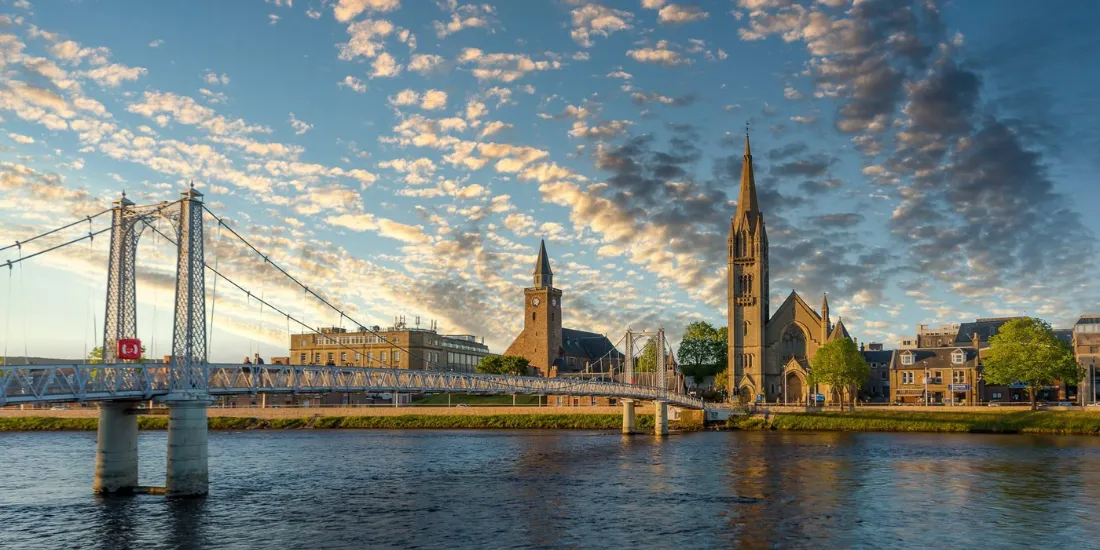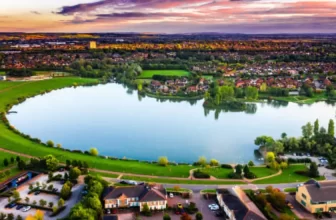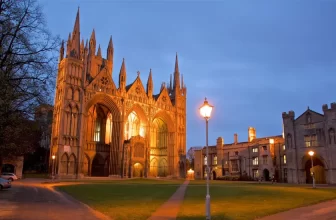
Arriving in Inverness: It’s Not London, And That’s Kind of the Point
The first thing that hits you when you land in Inverness isn’t the temperature (though it’s colder than you expect-it always is). It’s the stillness. You walk out of the airport or train station and there’s this strange, clear silence. Not eerie. Just… peaceful. Highland air is something else. It smells like old pine trees and drizzle. A kind of clean you don’t get in busy urban cities.
I remember lugging my suitcase down a cobbled path from the train station, eyes half-shut from jetlag. There were bagpipes playing somewhere in the distance (yes, really), and you could see this sweeping view of the River Ness as it curled around rows of stone houses and cafés. It instantly felt older, quieter, and somehow more grounded than anywhere I’d been before.
Inverness isn’t flashy. You won’t see skyscrapers or packed nightclubs that never close. But if your idea of the best study abroad experience is a meaningful balance between academic focus, affordability, and nature, this guide is going to walk you through exactly why studying in Inverness in 2026 might be one of the smartest decisions you’ll ever make.
Why Study in Inverness in 2026?
Let’s just say it-you probably didn’t have Inverness on your radar when you Googled study in the UK. London? Glasgow? Sure. But Inverness has something those cities don’t: peace, affordability, and a pace of life that gives you actual headspace.
Here’s what makes 2026 a solid year to apply:
- The UK government’s Graduate Route Visa is still in effect, which means you can stay and work in the UK for up to two years after graduating-without employer sponsorship.
- Tuition fees in Inverness tend to be lower. Expect to spend around £12,000–£14,500 per year for most undergraduate and postgraduate courses at universities in the region.
- Living costs in Inverness are 25–40% cheaper than in cities like London or Edinburgh. That means smaller housing bills, cheaper groceries, and you’re less likely to live off cereal and caffeine.
- Courses are career-aligned. Institutions in Inverness work closely with industries like healthcare, tourism, environmental science, digital media, and marine biology, all of which are important to the Highland economy.
And maybe most importantly? You’ll be situated in one of the most naturally beautiful areas in the UK-Loch Ness is literally 25 minutes away. That does something to your mental health. Especially during exam season.
2026 is also the year many Scottish institutions are expected to scale up tech and health science research following post-Brexit funding reinvestments-you’ll want to be part of that shift.
Why Is Inverness Important for International Students?
Inverness is small-yeah, I’ll say that. But what it lacks in scale, it makes up for in support. As an international student, that matters a lot. You’re not just another number here.
A few key facts:
- Roughly 10–12% of the student population in the region is international, and that’s growing steadily each year.
- Student support services are genuinely proactive-from airport pickup coordination to mental health counselling and career advice tailored for overseas students.
- Inverness has a growing reputation as a “green education city”, putting sustainability and climate learning at the center of many research programs.
- The cultural attitude? Friendly. You’ll genuinely get “welcome to Scotland” smiles from strangers when you tell them you’re a student here.
- Lots of opportunity to engage in community placements, outdoor science programs, and local internships-especially in tourism and hospitality if you want part-time income.
One friend from Malaysia put it best: “Inverness feels less like surviving a city and more like living a life that includes studying.” That sums up the student experience here.
Top Universities and Colleges in Inverness
Okay, let’s get into where you can actually study if you’re choosing Inverness for your international degree in 2026.
1. University of the Highlands and Islands (UHI) – Inverness Campus
- Tuition (International): ~£12,360–£14,200 per year depending on subject
- Popular For: Environmental science, healthcare (nursing, midwifery), marine biology, archaeology, renewable energy
- Campus Life: Contemporary, compact, and designed for focus. Small class sizes = professors who know your name.
- Student Vibe: Tight-knit. Smart people who are here with intention. Great student support services.
- Added Bonus: UHI has networked campuses, so you could study at Inverness but tag-team modules from other parts of Scotland.
2. Inverness College – Part of UHI
- Ideal For: Students looking to transition from diploma/foundation to degree, or studying short-term or technical programs such as construction, IT, or creative industries.
- Tuition: ~£7,000–£10,000/year depending on course
- Cool Perk: Massive fully-equipped creative arts studio and strong digital media program links with Highlands-based companies.
3. Highlands Theological College (for niche postgrad study)
- Small, specialized Bible and theology college that attracts postgrads from across the world.
- Entry Requirements: Strong academic portfolio and church sponsorship required.
4. UHI Graduate School (for Master’s and PhD)
- Offers niche degree programs in things like North Atlantic archaeology, climate resilience, and wildlife conservation.
- Tuition: Usually £13,000–£15,000 (international)
- Strong focus on research funding, especially EU/Scottish government-backed climate initiatives.
Final Thoughts on Unis Here:
If you’re reading this wondering whether Inverness has the right “brand,” stop. It has the quality, the value, and more real-world alignment than many big-name UK cities. And you’ll graduate with more than a degree-you’ll have space to think, grow, and plan your next stage.
Top Student Accommodation Properties in Inverness
Here’s the truth about student accommodation in Inverness: it fills up early, but it’s not as expensive or stressful as it is in places like Edinburgh or Glasgow. You’ve got options-and they won’t break your whole budget in the first month.
1. UHI Student Residences – Inverness Campus
- Cost: ~£450–£550 per month
- What’s included: Furnished single rooms, ensuite bathrooms, shared kitchens, heating, Wi-Fi
- Location: 2 minutes from UHI classroom buildings
- Pros: Safe, walkable, community vibe. Perfect for first-year or international students.
- Cons: Limited availability-these rooms go fast. Apply as soon as you get your offer.
2. Private Student Flats (Longman Road / Millburn Road area)
- Cost: ~£350–£500/month
- Setup: Shared kitchen/living with up to 4–6 other students
- Best for: Postgrads or those who want more independence
- Pro Tip: Use SpareRoom or OpenRent to find pre-vetted listings. Facebook groups can work-but be very careful with scammers.
3. Hostels or lodgings turned long-term lets
- Think quirky B&B-style homes rented out to students-this is pretty common near the city centre.
- Cost: £400–£480/month
- Feels more like “living with locals” than living in a dorm, which can be good (less noise) or not (less freedom).
4. Homestays with local families
- Cost: ~£350–£450/month (sometimes includes meals)
- Why it’s useful: Culturally immersive, good for improving your English
- Downside: Less independence, and curfews are sometimes still a thing.
Booking Tips:
- Start looking by April for September intake. Seriously.
- Always confirm if bills are included to avoid budget shocks later.
- International students: ask for a video tour if you can’t visit in person.
- Want cheaper rent? Look just outside city centre-but make sure public transport is good.
Popular Student Areas in Inverness
Unlike mega cities that make you choose between a two-hour commute or £900 rent, most places in Inverness are 15–30 minutes max by foot or bus. It’s one of the reasons students like it here.
1. Crown (near city centre)
- Vibe: Historic, charming, and walkable
- Rent: ~£500–£600 for private room, less in shared flats
- Pros: Close to cafés, restaurants, walk to campus or central library
- Cons: Slightly pricier due to its convenience
2. Dalneigh
- Vibe: Residential, working class, quiet
- Rent: ~£350–£450
- Pros: Very popular among students in shared accommodation
- Cons: Further from nightlife and city buzz if that’s what you’re into
3. Merkinch / Telford Road Area
- Vibe: Affordable and practical
- Rent: One of the cheapest (~£300–£400/month)
- Pros: Safe, quiet, short bike ride or 20-min walk to UHI
- Cons: Not much going on socially-but great if you want to save money
4. Raigmore / Culloden
- Vibe: Suburban with good green space
- Best for: Nursing and healthcare students near Raigmore Hospital
- Bonus: Good public transport back into centre
Cost of Living in Inverness
Okay, here’s what you’re actually gonna spend as a student living in Inverness. Forget those university websites that list unrealistic numbers from 2018-they don’t help anyone.
| Expense | Low (£) | Average (£) | High (£) |
| Rent (shared flat) | 350 | 500 | 650 |
| Food (groceries + eating out) | 100 | 150 | 250 |
| Transport (bus pass) | 35 | 45 | 60 |
| Phone + Internet | 20 | 35 | 50 |
| Social & leisure | 30 | 75 | 150 |
| Books & supplies | 10 | 25 | 60 |
| Miscellaneous | 25 | 60 | 100 |
| Total est/month | £570 | £890 | £1,320 |
Money-saving hacks:
- Student discounts everywhere-get a TOTUM card and a Young Scot card
- Take advantage of second-hand book swaps
- Shop at Lidl or Aldi for things like pasta, rice, veg, and cleaning supplies
- Cycle or walk-Inverness is safe and scenic, and free transport = more coffee money
Where most students overspend:
- Last-minute train tickets (plan ahead on Trainline)
- Eating out all the time instead of batch cooking
- High data SIM packages-get student-friendly plans like Giffgaff or SMARTY
Scholarships and Financial Aid (2026)
Let’s be real-not everyone has a savings account waiting to cover the full cost of studying abroad. The good news? There’s money out there-you just have to know where to look.
Government and External Scholarships
1. Chevening Scholarships
- For postgraduate students
- Covers full tuition, flights, accommodation, and living expenses
- Based on academic merit + leadership potential
- Deadline: November 2025
2. Commonwealth Scholarships
- For students from low/mid-income countries
- Often covers full MSc/MA courses in the UK
- Focus on development-themed fields (healthcare, sustainability, etc.)
University-Specific Scholarships (UHI)
1. UHI International Scholarships
- Offers £1,000–£3,000 fee reduction
- Based on academic history and early application
- Easy online form-short essay required
2. UHI Scotland Scholarship (Specific countries)
- For students from partner countries like India, Nigeria, Malaysia
- May cover up to 50% of fees for designated courses
Top Tips for Scoring Funding:
- Don’t wait-most deadlines are by Jan–Feb 2026
- Keep scholarship essays personal, not robotic. Talk about real goals.
- Save every email confirmation-you’ll need them for visas/logistics later
How to Apply – Step-by-Step Guide for 2026 Entry
Let me break this down the way I wish someone had for me-no confusing jargon, no recycled UCAS bullet points. Just what actually matters.
Step 1: Start Researching (Aug–Oct 2025)
Start comparing international degree programs in Inverness, especially those from UHI Inverness and related colleges. Look at modules, not just course titles.
You’re choosing a specific education experience, not a brand name.
Step 2: Get Your Documents Ready (Nov–Dec 2025)
Here’s what you’re going to need:
- Passport (valid at least 6 months beyond your intended stay)
- Academic transcripts (translated into English if needed)
- English language test scores (IELTS 6.0–6.5 minimum for most programs)
- Personal Statement / Statement of Purpose
- CV or resume, especially for postgrads
- Two academic references
Step 3: Apply (Dec 2025–Feb 2026)
- Undergraduate? Use UCAS (the central UK system)
- Postgraduate / Foundation / Short-term? Apply directly via UHI or college sites
Pro Tip: Don’t submit the same statement to 5 unis. (Sounds obvious-but soooo many applicants do this. Don’t.)
Step 4: Accept Offer & Pay Deposit (Mar–May 2026)
Once you receive a conditional or unconditional offer, pay your deposit (typically £1,000–£2,000) to secure your place. Only then can you request your CAS (Confirmation of Acceptance for Studies) needed for your visa.
Step 5: Visa Application (May–July 2026)
Apply for your student visa UK online. You’ll need:
- Passport
- CAS
- Tuberculosis test (if your country is listed)
- Bank statements showing £1,023/month x 9 months + remaining tuition fees
Visa timeline? Usually 3–4 weeks, but don’t cut it close. Apply early.
Step 6: Sort Housing + Travel (June–August 2026)
Book your accommodation ASAP and check if your uni provides a free shuttle from the airport or has a welcome team. (UHI sometimes does if you land during orientation week.)
Step 7: Arrive, Settle In & Show Up (by Sept 2026)
Bring hard copies of all documents, plus digital backups. Get your BRP, register with a GP, open a UK student bank account (Monzo and Santander are easiest), and… breathe.
You made it.
Student Visa and Work Rules in 2026
The UK Student Visa is very doable-seriously. Just don’t wait until the last second.
Requirements:
- CAS from a licensed UK institution
- Proof of financial means
- Valid passport
- English language requirement met (usually IELTS/TOEFL)
- Visa application fee: £490
- Immigration Health Surcharge (IHS): £776/year
This IHS payment covers NHS healthcare, so yep-you get access to doctors, emergency care, and basic services just like a UK citizen.
Processing Time:
- 3–4 weeks (standard)
- Fast-track options available in some countries for extra cost
Can You Work on a Student Visa?
Yes. Here’s the breakdown:
- During term time: 20 hours/week max
- During breaks: Full-time allowed
- Freelancing may not be permitted-stick to part-time contracts until you confirm with visa support.
After You Graduate?
You’re eligible for the Graduate Route Visa (formerly post-study work visa). That’s a 2-year stay extension (or 3 for PhDs) to find work or start a career-no employer sponsorship needed at entry.
Major win if you want to turn this study abroad gig into something long-term.
Local Transport in Inverness (2026 Guide for Students)
Getting around Inverness is surprisingly low-stress-and affordable, too.
Options:
- Bus: Stagecoach Highland runs most services. Student discount cards cut fares down. £35–£45/month unlimited travel pass.
- Bike: Safe cycle lanes and short distances make bikes the best investment you’ll make.
- Walking: Central Inverness is compact-you can walk from many neighborhoods to UHI in 25 minutes or less.
- Train: Great for weekend trips to Edinburgh or Aberdeen. Use Railcards for 30% off.
Must-download apps:
- Traveline Scotland (for all public transport info)
- Trainline (cheap intercity train fares)
- NextBuses (tracks buses in real time)
- myUHI app (class schedules, campus alerts, library hours)
Student Life, Food Culture and Highland Vibes
Look-studying in Inverness isn’t buzzy club nights or rodeo-sized lecture halls. And that’s the point.
Campus Life:
Think small seminar groups, casual student unions, and outdoor events like Highland hikes and film festivals. Most students get involved in at least one club or society within the first term-it’s how you find community here.
Food Scene:
- Takeaways = fish and chips (obviously), pizza, Vietnamese Pho, and amazing Indian spots like Rajah or Cinnamon
- Groceries = Aldi, Tesco Express, Lidl
- Cafés = Try So Cocoa by the Ness and Velocity Café for great coffee + bikes (yes, both)
Weekend Activities:
- Hike up to Craig Phadraig
- Ness Islands trail walk after class (especially autumn-pure magic)
- Take a train to Ullapool or a bus to Loch Ness
- Go for Thursday quiz nights at The Malt Room
Cultural Adjustment Notes for International Students:
- People are reserved but friendly-learn to start convos at society meetups or uni welcome events.
- The Scottish accent is real, but don’t stress. You’ll adjust fast.
- Things move slower here-and that’s not a bad thing.
One thing that surprised most students? How quickly it starts to feel like home.
Internship and Career Opportunities After Studying in Inverness
Career-wise, here’s where Inverness shines: niche fields and industries tied to its location.
Key Sectors Hiring:
- Renewable energy (wind/hydro power programs)
- Healthcare and public services (Raigmore Hospital is one of the largest employers in the Highlands)
- Marine biology and aquaculture
- Green tourism, conservation, sustainability
- IT and education roles through public sector or startups
Where to Look for Internships or Work Experience:
- UHI’s career support team (one-on-one sessions available)
- Myjobscotland for public sector internships
- LinkedIn Jobs + Indeed UK
- Write speculative emails-people do respond in small cities
Paid vs unpaid?
You’ll find both. Most student jobs are in retail, hospitality, or admin gigs. Many internships are unpaid but lead to part-time work or full-time employment if you impress the team.
Application Timeline for 2026 Study Abroad in Inverness
| Date Range | What to Do |
| Sept–Oct 2025 | Research programs, budget, shortlist unis |
| Nov–Dec 2025 | Prepare your SOP, references, test scores |
| Dec 2025–Feb 2026 | Submit applications (UCAS + direct) |
| March 2026 | Apply for scholarships & student housing |
| April–May 2026 | Accept offers + pay deposit |
| May–July 2026 | Apply for visa + plan flights/pre-departure |
| August 2026 | Complete banking, NHS, packing, final docs |
| September 2026 | Arrive + attend orientation week at UHI Inverness |
Public vs Private Universities
| Feature | Public (e.g., UHI) | Private (not common in Inverness) |
| Tuition fees | £12,000–£15,000 | £15,000–£20,000+ |
| Class sizes | Small-to-medium | Often small, sometimes elite |
| Scholarships | Yes (academic/merit-based) | Rare |
| Research access | High across campuses | Typically limited |
| Access to student support | Strong | Varies widely |
Truth is, public universities dominate in Inverness-and they’re some of the most community-based institutions you’ll ever experience.
Final Thoughts: Why Inverness Might Be Right for You
Inverness isn’t loud. It’s not trendy. It won’t dazzle your Instagram feed. But if what you really want is to focus, grow, explore the outdoors, feel safe, save money, and genuinely connect with people-you’ll find more here than you expected.
It’s calm without being boring, challenging without being overwhelming, and quiet in ways that help your brain breathe.
First-Year Tips :
- Use your student ID for everything-tons of hidden discounts
- Your classmates are your network-befriend them early
- Layer your clothing, not your suitcase-don’t overpack
- Ask for help-your professors will actually reply
- Leave weekends open. Spontaneous trips to the Highlands? Absolutely worth it.
Top FAQs about Study in Inverness
Not really. Monthly costs range from £600–£900, significantly cheaper than other UK cities.
Yes-20 hours per week during term, full-time during holidays.
Nope-English is the primary language, though you’ll hear Gaelic signs and accents.
Extremely. Rated one of the safest cities in the UK.
Yes. The Graduate Route Visa allows 2 more years in the UK, no sponsorship needed upfront.
Yes-via UHI and UK programs like Chevening or Commonwealth scholarships.
Start research by Sept 2025, aim to apply by January 2026 for best results.
Ready to apply?
Still unsure? Thinking about a short-term program first?
Head over to studyabroadadvice.com for zero-pressure support, free tools, scholarship resources, and direct Q&A with students who’ve already done it.
You’re not just picking a university-you’re choosing how the next chapter of your life begins.
And honestly? Inverness might just surprise you-in all the right ways.






